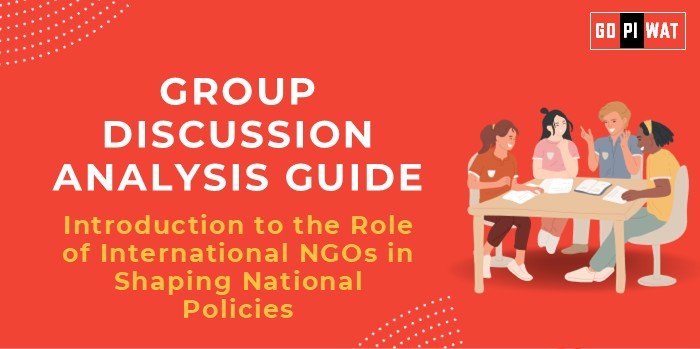📋 Group Discussion (GD) Analysis Guide
🌐 Introduction to the Role of International NGOs in Shaping National Policies
🌟 Opening Context
International NGOs (INGOs) are pivotal in addressing global challenges such as poverty, education, climate change, and human rights. Their influence extends to shaping national policies through advocacy, technical expertise, and funding for development projects.
📜 Topic Background
The influence of INGOs intensified post-World War II, with the establishment of organizations like Amnesty International and Oxfam. Today, these entities collaborate with governments and institutions worldwide to address pressing global issues. However, their growing role often sparks debates on sovereignty, transparency, and accountability.
📊 Quick Facts and Key Statistics
- 🌍 Number of Active INGOs Worldwide: Over 40,000, managing an estimated $30 billion in annual expenditures.
- 📑 Policy Influence: INGOs significantly influence policy development in developing nations through advocacy and technical support.
- 🌎 Global Reach: INGOs operate in over 190 countries, focusing on climate action, health initiatives, and disaster relief.
- ⚠️ Controversies: In 2022, Transparency International reported significant scrutiny of INGOs for opaque funding practices, highlighting the need for enhanced transparency and accountability.
👥 Stakeholders and Their Roles
- National Governments: Collaborate or contest INGO inputs based on alignment with national priorities.
- Citizens: Direct beneficiaries of INGO programs in areas like health and education.
- Corporate Sector: Supports INGOs through partnerships or corporate social responsibility (CSR) initiatives.
- International Bodies: UN and World Bank utilize INGOs for implementing global development programs.
🏆 Achievements and Challenges
✨ Achievements
- Climate Action: INGOs like Greenpeace played a key role in advancing the Paris Agreement and net-zero commitments.
- Health: Initiatives like Rotary International’s contribution to polio eradication campaigns.
- Disaster Relief: INGOs such as the Red Cross provided vital aid during the 2023 Turkey-Syria earthquake.
⚠️ Challenges
- Sovereignty Concerns: Governments like India and China restrict INGO operations citing national security.
- Transparency Issues: 2022 scrutiny highlighted opaque funding practices.
- Global Comparisons: While countries like Sweden foster INGO-government collaboration, others, such as Russia, impose strict regulations.
- Case Study: Greenpeace faced resistance in India for allegedly disrupting economic projects.
📚 Structured Arguments for Discussion
- Supporting Stance: “INGOs are indispensable for addressing global inequalities and advancing human rights.”
- Opposing Stance: “The influence of INGOs can undermine national sovereignty and prioritize donor agendas.”
- Balanced Perspective: “While INGOs bring expertise and funding, stronger transparency and cultural sensitivity mechanisms are essential for meaningful impact.”
💡 Effective Discussion Approaches
- Opening Approaches:
- Use a striking statistic: “Over 40,000 INGOs influence billions globally with a $30 billion annual expenditure.”
- Cite a recent event: “Transparency International’s 2022 report flagged critical funding issues in INGOs.”
- Counter-Argument Handling:
- Recognize concerns about sovereignty while emphasizing INGOs’ collaborative efforts in climate action and health.
🛠️ Strategic Analysis of Strengths and Weaknesses
- Strengths: Expertise in global challenges, access to vast funding, partnerships with international organizations.
- Weaknesses: Dependency on donor interests, lack of transparency in some operations.
- Opportunities: Collaborating on issues like climate change and public health can create positive impacts.
- Threats: Regulatory pushbacks and nationalistic policies limit INGO effectiveness.
📖 Connecting with B-School Applications
- Real-World Applications: Projects in international development, CSR strategies, or sustainability initiatives.
- Sample Interview Questions:
- “How do INGOs balance donor priorities with local needs?”
- “What measures can improve the transparency of INGOs?”
- Insights for B-School Students: Explore operational efficiencies, develop scalable CSR models, or analyze global policy influence for internships or projects.


